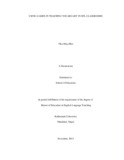
Please use this identifier to cite or link to this item:
https://hdl.handle.net/20.500.14301/241Full metadata record
| DC Field | Value | Language |
|---|---|---|
| dc.contributor.author | Rai, Tika Maya | - |
| dc.date.accessioned | 2023-04-24T12:27:58Z | - |
| dc.date.available | 2023-04-24T12:27:58Z | - |
| dc.date.issued | 2013-11 | - |
| dc.identifier.citation | Rai,T.M.(2013).“Using games in teaching vocabulary in EFL classroom. | en_US |
| dc.identifier.uri | https://hdl.handle.net/20.500.14301/241 | - |
| dc.description.abstract | The main purpose of the study was to identify how the secondary level English teachers teach vocabulary in the private schools as well as to evaluate how they use games for teaching vocabulary and to explore the how they perceive the effectiveness of teaching vocabulary through games. Adopting ethnography as research method it was carried out to investigate the teacher’s understanding on teaching vocabulary through games that existed in the schools and their current practices in teaching and learning language. Similarly, six English teachers were selected from secondary level of private schools. For this study, the data was collected through classroom observations and interviews. In order to analyze the collected data, the interpretive qualitative research paradigm was adopted. The findings of this research encompass perception of teachers who are the major stakeholders in using games in teaching vocabulary. The findings also revealed that, all the teachers had positive attitudes towards language games. Since they found that games were very fruitful to arouse students’ interest and motivation. Games promote friendly environment where monotony of the learners and their anxiety were reduced easily. However, it was found that the teachers don’t use games frequently due to some challenges such as time constraint, lack of training and knowledge, lack of proper physical facilities and teaching materials and so on. Based on the findings of my research study, I have suggested that the teachers who have been teaching English as a foreign Language should use games in teaching and learning language. Because games provide fun, relaxation and reduce anxiety and fear among the learners and encourage them to get involved in any kind of activities or task that are addressed by the teachers. Lastly, I have also suggested to the syllabus designers and textbook writers to include more games in the English course book. | en_US |
| dc.language.iso | en | en_US |
| dc.title | USING GAMES IN TEACHING VOCABUARY IN EFL CLASSROOMS | en_US |
| dc.type | Dissertation | en_US |
| local.school.name | SOED | en_US |
| local.school.department | DOLE | en_US |
| local.school.program | Master of Education in ELT (2 years) | en_US |
| Appears in Collections: | Research Report | |
Files in This Item:
| File | Description | Size | Format | |
|---|---|---|---|---|
| Tika thesis.pdf | 1.05 MB | Adobe PDF |  View/Open |
Items in DSpace are protected by copyright, with all rights reserved, unless otherwise indicated.